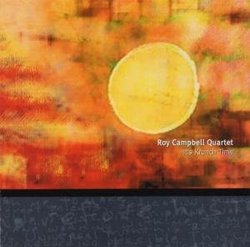Jaw-dropping virtuosity made accessible
Jan P. Dennis | Monument, CO USA | 11/20/2002
(5 out of 5 stars)
"The avant-garde jazz scene has always been hugely concerned with sonic palettes. Roy Campbell's new release on Matthew Shipp's innovative Thirsty Ear label is no exception. Take the opening cut, "Tenderness of Spring." Wilber Morris's achingly beautiful arco bass sets the proper tone, one of gorgeous tonalities. Not really "program music," but certainly resonating with that move conceptually, everything seems bursting with a pent-up energy, much like springtime."It's Krunch Time" marvelously displays this band's killer chops. Starting with an off the charts bass solo by the remarkable Wilber Morris, and including some very tricky and insanely fast trumpet work by the leader, everyone contributes mightly. One doesn't necessarily think of vibes meister Khan Jamal as an avant-garde player (although he's played in a wide variety of contexts, and he displayed some very interesting moves on his brilliant and obscure Stash release, Don't Take No!), but his solo is revelatory.The band takes a fairly straightforward reading of the Monk classic, "Bemsha Swing," but you have to receive it in its proper context. Monk was such an outrageous innovator in his time that it does little justice to his genius to deconstruct or even radically modify what he did. Thus, a plain reading achieves a kind of reverse avant-gardism by virtue of its recognition of the inherent virtues of the material per se."New Groes for the New Millenium" (I have no idea what the title means), a rather unadorned blues, strikes an ironic chord. The mood here seems to be one of retro-hipness, i.e., if you can't get on board with this pseudo-nostalgic vibe, you're in need of cultural recycling."Ode for Mr. DC," (again, titlistic obscurity), quickly becomes an attractive vehicle for solo workouts for each of the artists. I've always loved Khan Jamal's approach to the vibes--at once totally original, fluid, ideosyncratic, swinging--and he turns in a killer solo here. Guillermo Brown also shines with an off-kilter drum solo, and leader Campbell spices things up with a just-slightly-gone-south trumpet solo."Khanducting" should prove once and for all that Khan Jamal is the reigning dude on vibes. It hurts this diehard Bobby Hutcherson fan to say it, but it's true. What Jamal does on this cut is strickly mind-boggling. Campbell also contributes some trumpet work that must be heard to be believed.The next cut, "The Opening," displays a way strange vibe. Initially coming across as merely a vehicle for Campbell's prodigious chops, it eventually resolves into a kind of shimmering vibrancey all its own. Although I can't say it's the kind of thing I'd like to listen to all the time, it nevertheless contains a kind of uncompromising aural integrity. Once again, Khan Jamal proves he's the man with his faux-oriental solo."The Star Spangled Banner," a solo performance by Campbell that is perhaps even more irreverant than Jimi Hendrix's famous reading, perfectly caps these outrageous yet glorious proceedings.Surely It's Krunch Time is some kind of ultimate statement. Featuring some of the finest and most individualistic players on the progressive scene at the top of their form, it is a disc that is not to be missed by anyone who has even the faintest attraction to music of this type."


 Track Listings (8) - Disc #1
Track Listings (8) - Disc #1